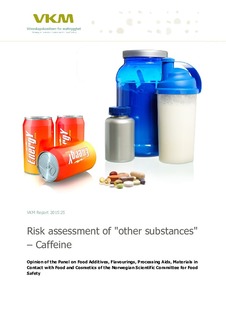Risk assessment of "other substances" – Caffeine. Opinion of the Panel on Food Additives, Flavourings, Processing Aids, Materials in Contact with Food and Cosmetics of the Norwegian Scientific Committee for Food Safety
Husøy, Trine; Mathisen, Gro Haarklou; Bruzell, Ellen Merete; Granum, Berit; Hetland, Ragna Bogen; Rohloff, Jens; Wicklund, Trude; Steffensen, Inger-Lise
Research report
Published version
Permanent lenke
http://hdl.handle.net/11250/2461128Utgivelsesdato
2015Metadata
Vis full innførselSamlinger
- Institutt for biologi [2571]
- Publikasjoner fra CRIStin - NTNU [38070]
Sammendrag
The Norwegian Scientific Committee for Food Safety (VKM) has, at the request of the Norwegian Food Safety Authority, assessed the risk of 100 or 300 mg/day of caffeine in food supplements and in energy drinks containing 32 mg/100 ml. VKM concludes that:
• It is unlikely that a dose of 100 mg of caffeine per day from food supplements causes adverse health effects in children (10 years and above), adolescents (14 to <18 years), pregnant women and fetus, lactating women and the breastfed infant and adults (≥18 years).
• A dose of 300 mg of caffeine per day from food supplements may represent a risk of adverse health effects in children (10 years and above), adolescents (14 to <18 years), pregnant women and fetus and lactating women and the breastfed infant. Consumed as a single dose, 300 mg of caffeine from food supplement may represent a risk of adverse health effects in adults (≥18 years). Consumed throughout the day, it is unlikely that a dose of 300 mg of caffeine per day from food supplements causes adverse health effects in adults. The dose is above the intake that may increase sleep latency and reduce sleep duration.
• Drinking pattern reflecting a high acute intake of caffeine from energy drinks (containing 32 mg caffeine/100 ml) may represent a risk of adverse health effects in children (3 years and above), adolescents (14 to <18 years), pregnant women and fetus and lactating women and the breastfed infant and adults (≥18 years). In addition, the intake is above the intake that may increase sleep latency and reduce sleep duration.
• It is unlikely that a drinking pattern reflecting a mean chronic intake of caffeine from energy drinks (containing 32 mg caffeine/100 ml) causes adverse health effects in children (3 years and above), adolescents (14 to <18 years), pregnant women and fetus, lactating women and the breastfed infant and adults (≥18 years). In addition, the intake is below the intake that may increase sleep latency and reduce sleep duration.
• It is unlikely that a drinking pattern reflecting a high chronic intake of caffeine from energy drinks (containing 32 mg caffeine/100 ml) causes adverse health effects in children (3 years and above), adolescents, pregnant women and fetus, lactating women and the breastfed infant and adults. The intake is above the intake that may increase sleep latency and reduce sleep duration for children (3 to <10 years) and adults, whereas it is below for children (10 to <14 years) and adolescents.
